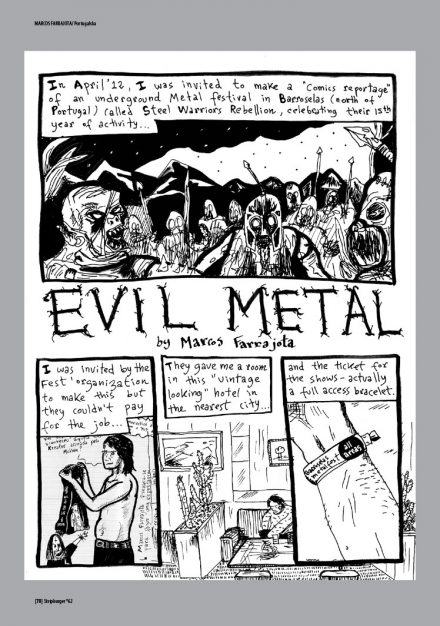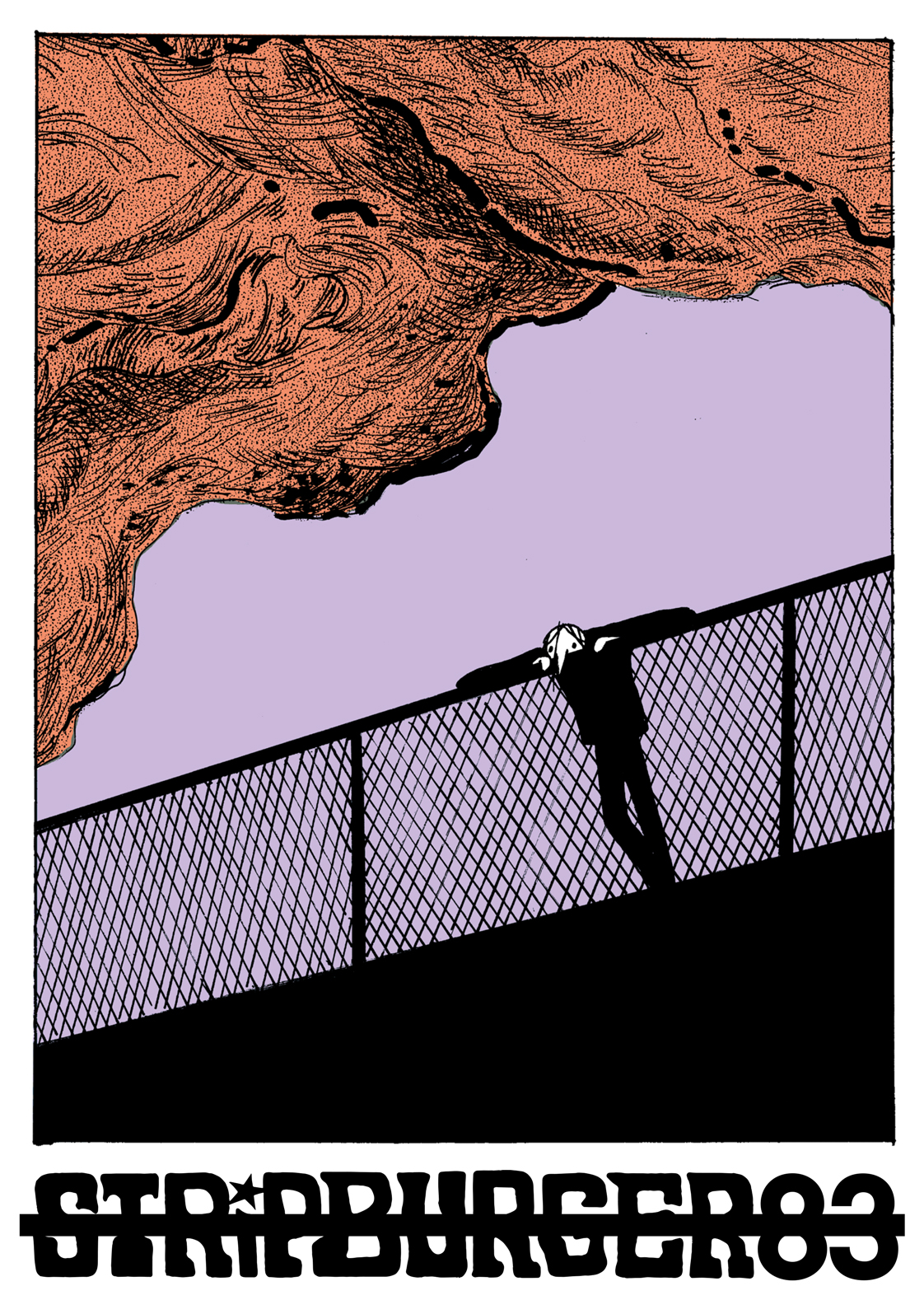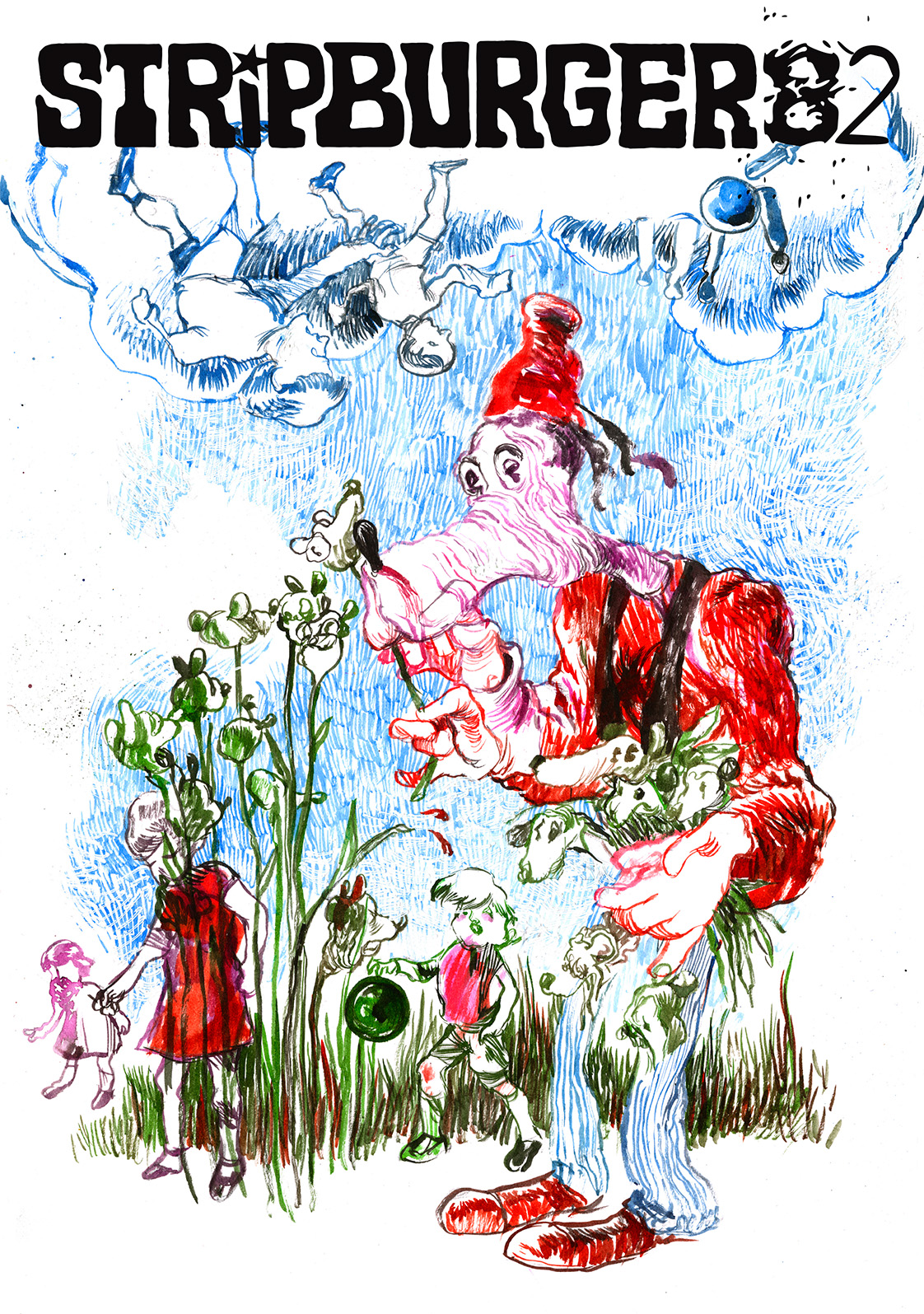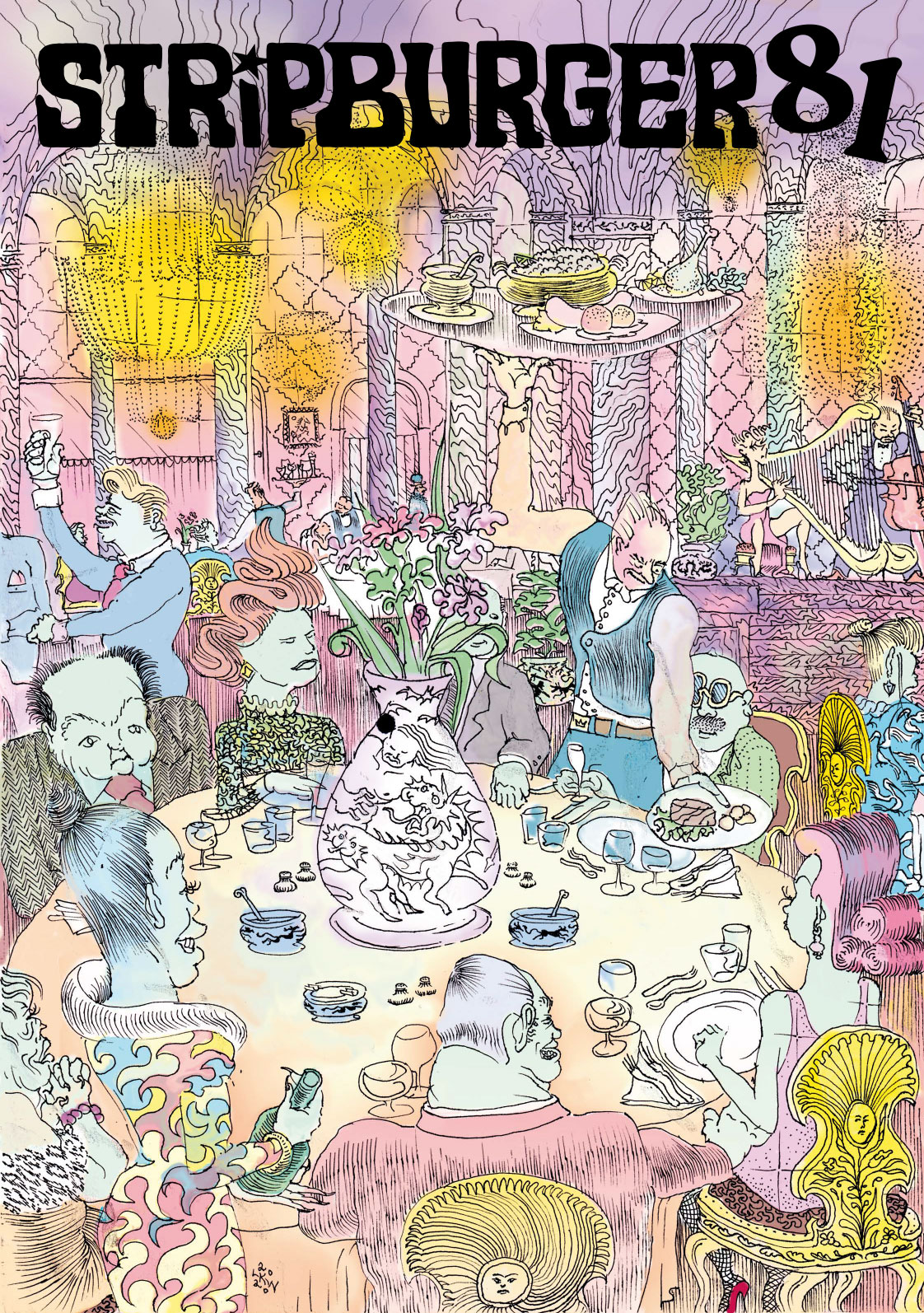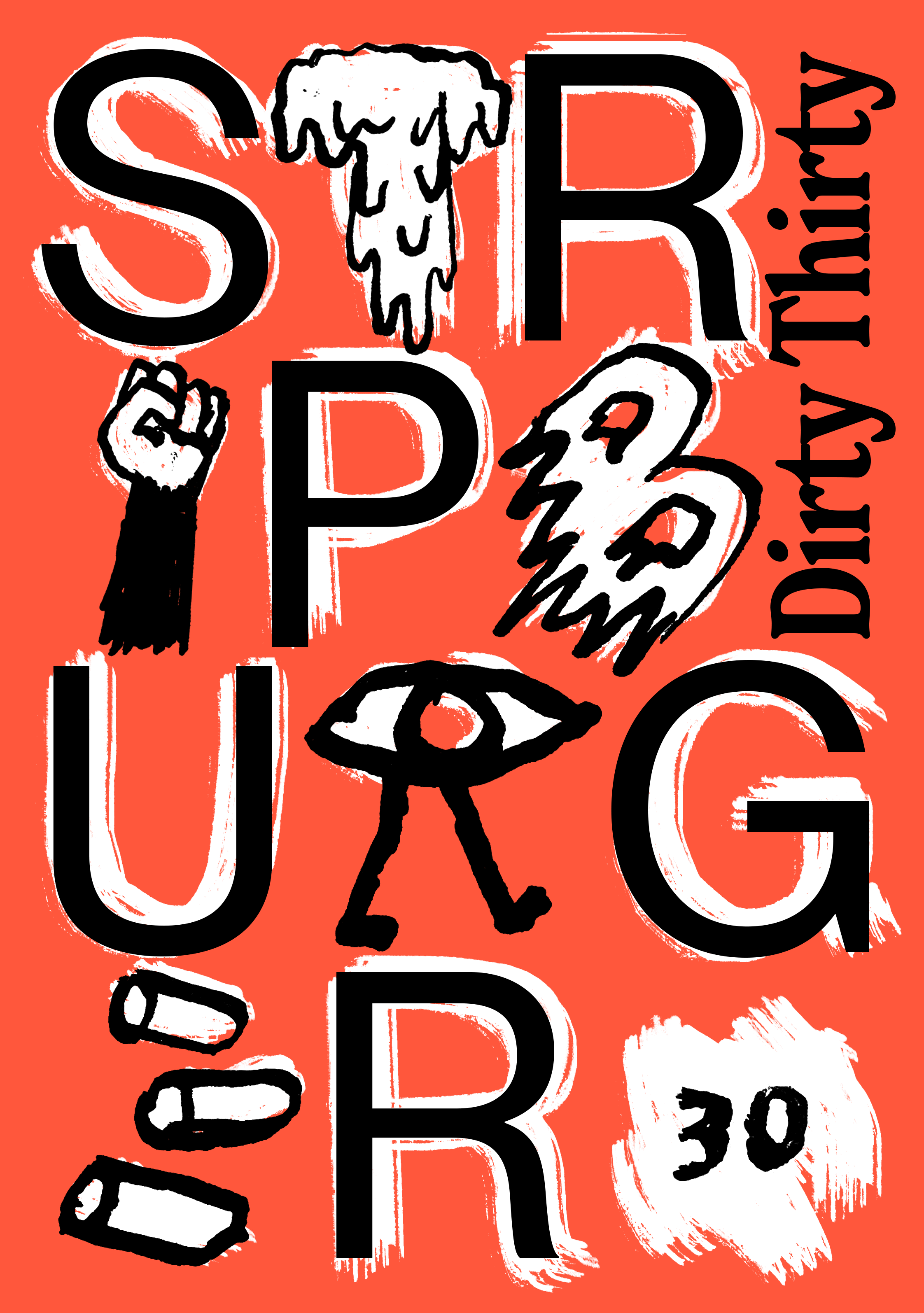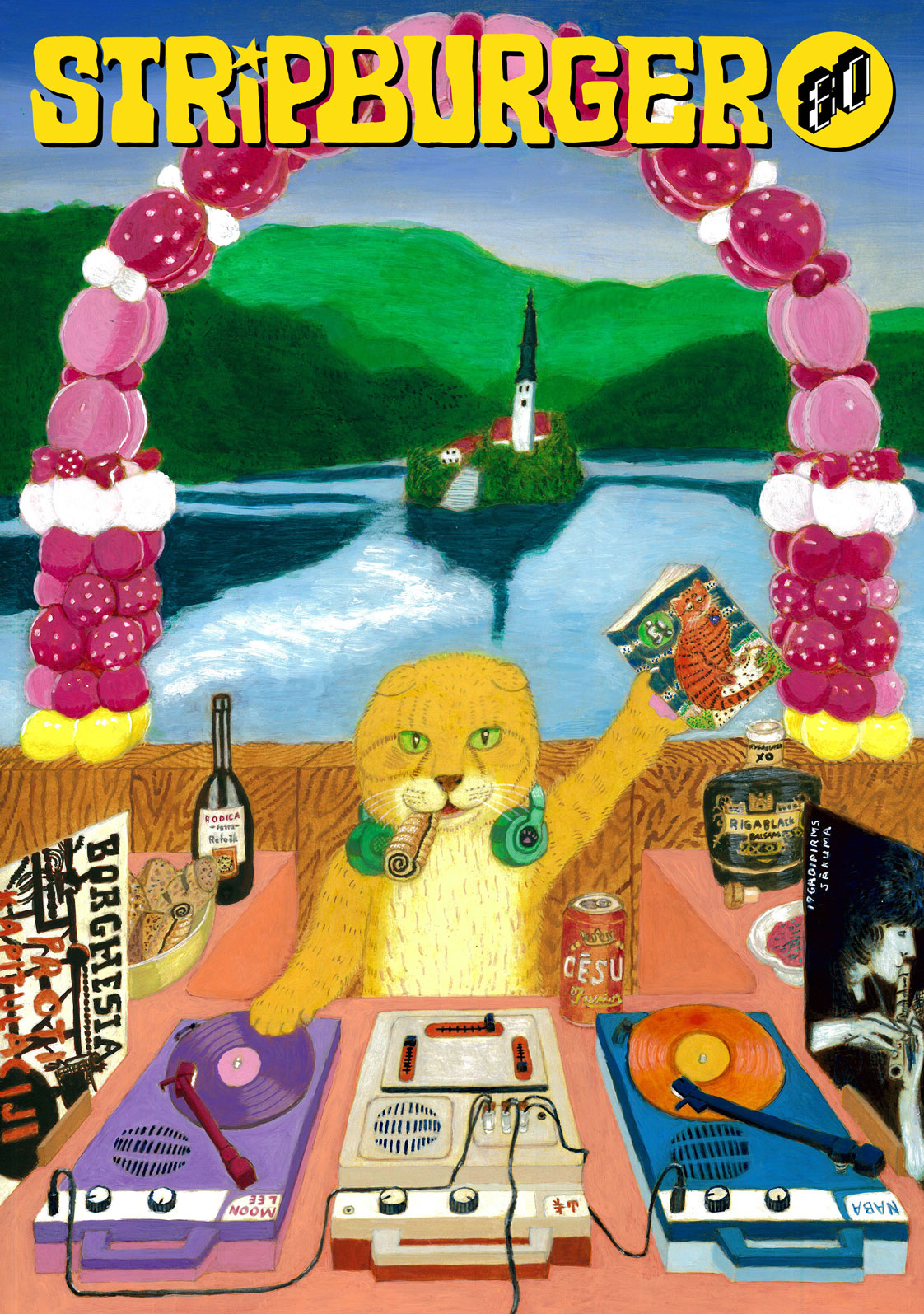Marcos Farrajota (Portugal) – interview, Stripburger 62, December 2013
M. F. is a young man who is quite rapidly approaching middle age, but he nevertheless manages to be childishly fascinated by every single thing that proclaims itself as being ‘alternative’, ‘radical’ or any other adjective in this style of terminology. He gets so enthusiastic that he often even publishes something or at least helps a product to reach an interested audience. Another cause of admiration – given the young man’s age – is his unusual ability for physical recovery: even in the event that last night’s drinking only finished this morning, he will certainly be present at the stand, enthusing potential buyers for his ware patiently and without any cynicism as soon as the comics / alternative / radical (and anything else in this kind of terminology) event officially opens its doors. That’s what he’s like.
Introduction by Jakob Klemenčič. Interview by Kaja Avberšek and David Krančan
Let’s start with Bedeteca, your home institution.
Bedeteca de Lisboa is a comics library created in 1996 by the City Hall of Lisbon. Until 2002, it was the most important public institute supporting comics in Portugal as it helped young artists and new editors, republished classics and published essays about comics and their history. It also organised exhibitions (with catalogues) and festivals. All this was possible thanks to the organising skills of its director João Paulo Cotrim. Things started to fall apart after he left because all the projects depended on the political support of the then-mayor João Soares. From 2002 – 2006 we had a good programme, but since then we’ve had to work with a ‘zero budget’. In 2009 we gave up doing exhibitions (even at zero cost) because of the problems with the building where Bedeteca resided. In 2010 the director Rosa Barreto left and the City Hall didn’t find a substitution for her. This is where we are now: no leader, no team and just two people taking care of the library – a damn good library, by the way!
What exactly was your function at Bedeteca in the ‘golden times’? Were you officially employed?
I used to manage the programme for the Salão Lisboa Festival and other events, curate exhibitions, take care of the website bedeteca.com (where you can read the Portuguese comics history between 2001 and 2010!), to edit and publish books, catalogues and magazines (like Quadrado magazine or Lx Comics collection for new authors), give comics workshops… a little bit of everything. I started working in Bedeteca in 2000 as an ‘independent worker’ which was an illegal way of working for companies or public institutions. As an independent worker you can work as any other employee, but you are not officially in the ‘house’. You’re independent, so you can be fired whenever they want and all that… ah, the old days of ‘recibos verdes’ (the tax figure of this kind of employment in the ‘90s and ‘2000s). I’ve been working as a normal employee since 2009. Yup, I’m a public worker – I’m the enemy…
So now you’re officially at Bedeteca?
Yes, that’s my ‘day job’ or my ‘pay the rent job’. But since 2010, I refuse to be more than a librarian in Bedeteca. No more having Jakob Klemenčič at my place! Let me explain – in 2008, when Stripburger was here in Lisbon with the Honey Talks exhibition, the show was held in Bedeteca de Lisboa, which is funded by the City Hall. Despite having the exhibition for free and the Slovenian guests coming all the way here for free, the City Hall didn’t want to pay for their accommodation. So I offered Jakob to stay at my place, and my boss at the time also arranged some accomodation for David Krančan. A I don’t think this is the right way to go about it, so I’m not sacrificing my own resources for a public institution anymore.
Also, there seems to be no clear idea or plan of what to do with Bedeteca, so it doesn’t make sense to plan anything right now, So I’m just being a good librarian. If someone comes here looking for a comic book and doesn’t know the name of the author or even the title, I’ll still be able to find it! I’m a nerd in this respect I guess… Of course, Mr. Jakob has been at my place since then, but that’s another story…
Does the future of Bedeteca money-wise depend only on the good will of the municipality? Has anyone tried to reactivate it with some sort of EU funding, programmes like EVS, Leonardo da Vinci etc…?
Bedeteca is a public library, a member of the municipality libraries network (BLX), which is part of the Culture Department of the City Hall. It’s not a private institution so it has hierarchy and rules that make everything slow and dull. Previously there was a connection with the mayor and the culture alderman who could speed things up or at least give us some guide-lines. No one in the City Hall is interested in or understands comics anymore and there’s been no top management since Rosa Barreto left – Bedeteca is a headless chicken, except this chicken can give you more than 8000 volumes of comics to read!
… among which there are quite a few books you have helped to produce yourself. You are generally known as a (self)publisher and as an activist in different areas of the alternative scene, but you are also a comics artist. How did you get into comics anyway?
I’ve liked them since I was a kid and this passion went the usual way; as a shy and antisocial person, I was more into reading comics than speaking with peers. I was drawing here and there, getting crazy about super-heroes and later underground comix. After that I got into the fanzines scene and started to make one in 1992. It was titled Mesinha de Cabeceira. Then I worked here and there, the usual way again: xerox copies, autobiography comics, getting pissed and stoned, getting pissed with the comics scene, doing DIY and becoming famous for 15 minutes in some popular episodes of the Loverboy series. Then I went back to zines, started doing DIY again and got really fucking pissed with the comics scene, but continued to create stuff. Now I do it less, since the editorial work takes a lot of time. I was lucky to get a grant to make comics outside Portugal in 2011. In this way, I’ve already made half of a book which is to be published someday…
Tell us more about the upcoming book.
The whole thing is composed of essays and autobiographies about archives, collections and our relationship with objects. Basically, I’m trying to figure out why we buy so many records, books, zines, tapes etc…
Will you publish it with Chili Com Carne? How does your publishing house work?
For now I’m publishing it by chapters in my zine Mesinha de Cabeceira (and in issuu.com/mmmnnnrrrg) but who knows when I’ll finish it anyway… I need another grant, Hahaha! The whole thing is a little complicated to continue when I’m back to the ‘9 to 5’ thing and the editorial stuff on top of that, (Chili Com Carne and MMMNNNRRRG) then still trying to do creative work…
Chili Com Carne is a non-profit organisation of young artists that mutates every 2 years with the election of a new editorial board. We have been present since 1995, got legalised in 1997 and focused on publishing in 2000. You can get a lato sensus idea of the CCC on the website. The majority of our publishing represents comics but we’ve also published literature, drawings, essays and music because we like all of that…
I guess CCC was always a melting-pot of ideas which couldn’t be satisfied only with comics or the comics scene – or any scene at all. Of course the comics scene is square but you could say the same for music or literature as well. ‘Networking’ was always the goal before the word went hype on the internet.
What about MMMNNNRRRG? We can hardly follow all the activities you’re involved in…
MNRG is a solo project of mine created in 2000 with the intent of publishing all the comics that nobody wants! It’s been a ‘dynamic duo’ project with Joana Pires taking care of the design and my bad mood since 2010, hahahaha. Most of the label aspect is connected with an ‘art brut’ feeling of art with no compromise and no fixed genre. The idea was to publish unique voices in comics and illustrations.
How many publications have you produced until now? Could you point out some of your most important achievements?
Maybe around 50 books of both CCC and MNRG, I should go check on the website of CCC and MNRG… oh, and two music records as well!
I guess the most important are the first ones: Mutate & Survive and O Macaco Tozé. The first because we had this crazy idea of making a ‘MEGA-zine’, a 200 page long comic book featuring independent artists from Portugal. Thanks to the international promotion (I suspect most of it came from Stripburger!) we started to receive stuff from all over the world! In the end there were 77 artists from 16 countries. It was such a joy to get to know all these people. As for Macaco (crazy comics done by Janus), it was my first book under the MNRG label and was my response to some stupid stuff happening with publishing houses in Portugal at that time. This was in 2000, when comic publishing and author’s comics were at their peak in Portugal. I was really angry, and passionate about making this MNRG statement to ‘protect the innocent artists from the evil publishers’. Apart from that, I also wanted to show ‘fucked up comix’ – I wanted to point out that it wasn’t just nice stuff!
Lately, I think it could be Boring Europa and Futuro Primitivo anthologies, because I’ve tried to change the editor’s role into a narrative DJ concept or, in other words, into a ‘comix-remix’. This means to ‘screw and chop’ comics by other artists transforming them into new comics. It’s not an easy job because there haven’t been many experiments of this kind in the history of comics. I have a slight sensation of failure but I’m proud that I’m trying to introduce a new concept into comics…
Sounds pretentious, but that’s why I started to write articles about it. They got published in the newspaper Kuti and in the book Metakatz and it seems like no one knows that there have actually been any experiments in this field; from Max Ernst to recent anthologies Tonto and Giuda.
What are the channels of distribution for your publications? Is it easy to buy your stuff in bookshops throughout Portugal?
We’ve mostly had mixed experience with this since 2000. We had three different distributors. One was perfect, but closed down. She was a Belgian girl who lived in Portugal but later returned to Belgium. The latest distributor was a ‘motherfucker’ that didn’t pay us, so we had to get a lawyer and we won! I guess that’s how Portugal works. This is why now, and in the foreseeable future, we distribute by ourselves. There aren’t many bookstores left, just as record shops seem to be disappearing after the internet took over and an economic crisis happened. Most bookstores are now owned by four major chain bookstores (FNAC, Bertrand, Bulhosa and Almedina). Sometimes we succeed in convincing them to sell our books, sometimes we don’t – and we don’t know why… there is no scientific explanation! Still, we try not to rely on the mood of these messed up companies, so we start our own events to sell our books and put them in record or fancy design shops. There is also the idea to get different crowds to read comics or literature.
There are some comic shops in Portugal but I don’t work very well with them – and vice-versa – since all they want is to sell fetishist and fascistic superhero bullshit, manga porn and paedophilic Franco-Belgian albums. Of course there are some exceptions, like Mundo Fantasma in Porto, who we collaborated with to make an exhibition of Marcel Ruijters’ comics.
You obviously have many foreign readers; does your stuff reach them through the distribution channels or is it more hand-to-hand, dealing stuff at the festivals throughout (mostly) Europe?
The same as in Portugal, yes, hand-to-hand, festivals, etc., but there’re some official and solid connections with stores in Germany, Spain and Brazil.
Do you get any kind of subsidies from the Municipality of Lisbon or the Ministry of Culture? We cannot imagine you being able to do it all out of your own pockets…
We received some funding from the Portuguese Youth Institute and previously Cascais City Hall. Cascais is a suburb of Lisbon where I previously lived and where CCC was founded. It really helped to kickstart CCC between 1997 and 2001, but not so much a little later; Cascais City Hall became angry with us over an anthology we published with their support. They hated both a comic by Mike Diana and Rafael Dionísio’s hilarious text about the Dalai Lama. Later, they withdrew their donations saying that they didn’t support books anymore, hahahaha. This was in 2005, but last year they gave money for O Hábito Faz O Monstro, a comic book by Lucas Almeida, with a page where the Devil’s giant penis is cut with a sword. Some people just never learn!
Anyway, we’re progressively becoming able to sell enough to do whatever we want without depending on public grants and all that. This is a small operation in the sense that we don’t have an infrastructure like an office and materials or a regular programme of X books per year. The internet connection is paid from my pocket, the designers have their own Macs…
Everything is quite lively! We do what we want when we’re supposed to… so for instance, just to destroy your romantic idea of us, the books are being stored at my place (along with the clothes and shoes), at my parent’s house and at another member of CCC’s parents’ house. But everything is well packed and organised, so our parents don’t complain!
MNRG books are published by me only, so yes, it’s my money and it is possible to do it! It’s possible to do things without much money but only if you’re an organised person. You also have to be a long distance runner and you need to believe in your work. If you want to get money fast, well, become a hipster and spend 100 € on a t-shirt just to be at the right party with the right people! Of course it was hard in the beginning, but everything slowly comes together. For example: 10 years ago, nobody cared what I published. Now, just because we have books in FNAC megastores, people are amazed: “Oh, I saw your books at FNAC!” as though the books are better if they are sold in FNAC, Hahaha! Or some critic that used to ignore or write bad reviews about our books now writes ‘incredible work, blah blah blah’…
We all know that the alternative scene never operated with much money. Does editor’s work earn you enough money to live? If not, what are your bringing-home-the-bacon activities, if that’s not too personal?
I don’t have to earn anything at all with publishing! Like I told you, I work as librarian, a comic librarian, and then I spend my money on publishing, hahahaha.
Chili Com Carne is a non-profit association so everybody volunteers most of the time – writing, drawing, design, distributing, whatever! Sometimes, if there’s a better budget, we can pay someone for this or that. We pay all the expenses by selling our and other labels’ books, with quotas from the members of CCC and some ridiculous grants.
The small press thing is not about money but ideas. Books or other products you create serve to promote ideas or the authors in the sense that they can move to other ideas, situations or projects in the professional world. Of course, there’s some underground stuff that you earn good money from. Niches & nostalgia markets maybe, but I don’t want to release stupid garage rock records or stage drum’n’bass parties, do I?
What are the influences you would point out as the most important for your work? OK, we know it’s anarchism, punk, art brut, no compromise whatsoever… but can you be more specific and give us some names?
Hm, I don’t know… I think you named them all… add the industrial culture, noise and death metal, Fábio Zimbres – the editor and artist of the Brazilian comics magazine Animal – Brazilian magazines of the 90’s (Chiclete Com Banana, Piratas do Tiête…) and Escape magazine from the UK (edited by Paul Gravett). Those were the magazines that influenced me to start my own zine.
Still, there’s no need to invent or quote much, the tools and models are all here! You just have to do it by yourself, make mistakes, acquire experience, have fun, revolt and do something about it. People can help a lot, you just have to ask them for it to make connections, get the rewards and enjoy what you’re doing. You can do something original or at least different from what you wanted to do in the first place completely by mistake! If you want something perfect, go ‘franchising’. if you want something different, do it on your own and invite friends to do stuff with you. They will always screw up your original idea and thanks to that it will be a better project. I like the band Pigface! Seriously, what I wrote here is more or less their modus operandi… I guess I wanted always to be Martin Atkins!
I suppose most of the stuff that influenced me comes from music, not so much from comics or arts. I like the rock’n’roll vibe of doing things – not exactly like rock music, but doing things with energy and liveliness. I guess that’s why we made the Boring Europa tour!
Are you a fan of Le Dernier Cri? I suppose you are…
Yes, of course, but not of every book. ›››
We don’t share many methods and aesthetics, except for a few authors we both published: Mike Diana, Tommi Musturi, André Lemos and now Marcel Ruijters. But that’s it. I do ‘industrial printing’ books, and most of them comics or literature, while LDC makes hand-made artistic graphic books. What’s fascinating about LDC is their ‘democratic access to culture’ which is rooted in the punk culture. With LDC stuff you can have art at a reasonable price. That’s beautiful because unless you have 5000 € to buy original paintings, the only solution would be to put Bob Marley or Sex Pistols posters on your walls. With LDC you can have a nice drawing on a big silkscreen for 50 €! Isn’t that fair? Also, the funny thing about LDC is that as soon as you discover them, you want to be part of it somehow. You want to have an exhibition with them in your town, buy their stuff to sell or to give someone, etc. It’s not common to have this relation in the ‘normal’ elitist art world, they’re an irresistible inspiring force!
How do you find the right artists? You probably don’t just rummage through the ‘garbage’, but as you said, you take all the stuff that nobody else likes. You surely have some standards… do you have any preferred or favourite authors? Do they generally find you or do you find them? How does that happen? On fairs, exhibitions, on the internet, by word of mouth?
Well, the first three, Janus, Mike Diana and Christopher Webster, came from the zine world. I used to read their zines in the 90’s (which was a sane activity to do in those days) and then decided to create MMMNNNRRRG, because I wanted them to get a broader audience so that their work wouldn’t be forgotten after the xerox zines disappeared into the ‘underground’.
Things started to change with the end of the zine scene. I found some artists on the internet, like Neuro or Aaron $hunga, others through friendship or being their friends (Tommi Musturi, Igor Hofbauer, Aleksandar Zograf), and some because they live in my country (André Lemos, João Maio Pinto, Max Tilmann, Alexandar Brener & Barbara Schurz). Also at festivals; I met Marcel Ruijters at the Ravenna Komikaze Festival when he was doing the Inferno book (of which I saw some pages and loved it). Later I met him again in Angoulême where he gave me the Dutch edition and then in Helsinki we agreed to make the Portuguese edition! Finally I brought him to Feira Laica in Lisbon to release the book. I guess this is the most typical ‘comic nerd culture’ example you can get from me, hahaha… things just happen.
All this authors are my favourites. they touched me somehow because they are fresh and different, but nobody is paying attention to most of them. Some are just too dysfunctional to do publishing themselves so I show them to the world. Of course, nobody wants fresh and weird stuff, so some books take ages to sell out or to start selling… but anyway, that’s what publishers do, right? Find important stuff to show to the world!
You mentioned Feira Laica…
Feira Laica IS DEAD! Yeah! It was a naïve project created by me and José Feitor (illustrator and publisher – Imprensa Canalha) in 2004. We made 21 events under that name until the last one in December 2012. Basically it was a small press fair (not a comics event) that took place twice a year: one in June, which was like a summer party with books and beers, and one in December to exploit the Christmas consumerism frenzy. It grew quite well, especially during the last 2 years, even when we somewhat reduced the programme. Still, it always had concerts. Many Portuguese bands that are now famous did some of their first gigs at Laica, then exhibitions (with Stripburger as well), DIY films, programmes for children, workshops… It was all 100% DIY: we only had to find a big place and then we could organize everything in collaboration with people interested in helping… so I guess anarchy works! And it works really well because we had around 900 visitors in one weekend during the last one almost without the support of official media, of the traditional advertising (we even gave up doing posters and flyers in the last years) or the ‘all mighty bullshit’ ‘Facepoop’.
Then why did Feira Laica die after all? Financial issues? Personal problems? Quarrels? Boredom? We really wonder why because it seems like it was a very successful event! Does this mean anarchy doesn’t work that well after all?
Fuck no, of course it works!!! There is already another group of people doing the substitution event right now! See? You wicked Slovenian!
No money problems. Why? Because it never had any money! No personal problems or quarrels. Why? Because there was no money in it again! Just boredom! We were doing this for 8 years, always in the same way and we’ve shown that it works, so we decided it was time that someone else did it – maybe they can do it better, who knows? We don’t use the name Laica for the new events because we feel that people should use a different name as it’s going to be a different concept, working methods, people etc. At some point we actually considered just giving away the name, but then we remembered that we promoted the last one as the ultimate one. I’m not a Christian, I don’t believe in resurrection, not of the Nazarene pig and not even of this Russian bitch Laica! It’s over.
So, I guess you’re not planning any similar events in the near future?
Probably not: while others continue making these kind of indie events, I’ll help with what I can, of course. Maybe we’ll use Laica as a brand to help promoting these new initiatives – like some kind of a ‘quality sponsor’, as Laica turned out to be pretty influential. This might help if we can make sure that the next show has the same ‘Laica’ standards. Another thing: Laica could make a comeback, but only for social purposes, like doing a benefit to save someone’s ass. Let’s not forget that the whole the system is shaky so you must think in a resolute fashion and stay connected with your community. Like sweet lil’ George Bush Jr. said: ‘Either you’re with us or you’re against us!’ I guess he meant this in defence of the small press scene, but due to an enormous and incredible hierarchical mistake he invaded Afghanistan and Iraq.
Was there ever a time you wanted to quit the alternative scene and just be a pension-waiting public worker?
Should I have given up in 2001 or 2005 or 2008 or… today? No way, I’m like punk/hardcore bands and they’re just like cockroaches: always coming back and never giving up!
______________________________
BIOGRAPHY:
Born in 1973, in Lisbon where he lives and works at the Lisbon Comics Library / Bedeteca de Lisboa. Has been doing comix and zines since 1992. Founded Chili Com Carne in 1995 and MMMNNNRRRG in 2000. Works professionally with the comics medium since 1995: doing workshops, curating, making web content and radio programmes, writing articles in institutional and commercial magazines, books, catalogues and newspapers, web-sites etc… Sometimes he is an UnDJ annoying people in bars, but even so he was invited to ‘play’ at the important Jazz em Agosto Festival last year – and still doesn’t knows why…
BIBLIOGRAPHY AS AUTHOR:
É sempre tarde demais, Bedeteca de Lisboa, 1998
Loverboy series, with João Fazenda, 3 volumes, Polvo, 1998-2001
NM2.3: Policial Chindogu with Pepedelrey, Bedeteca de Lisboa, 2001
Noitadas, Deprês & Bubas, Chili Com Carne, 2008
Talento Local, Chili Com Carne, 2010
Boring Europa, with various artists, Chili Com Carne, 2011
Futuro Primitivo with various artists, Chili Com Carne, 2011
15º SWR Barroselas Metalfest, DVD booklet, SWR inc, 2013
www.chilicomcarne.com
gentebruta.blogspot.com
issuu.com/mmmnnnrrrg

